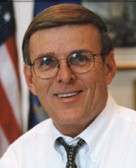Senate Commerce Committee Holds Hearing on
Communications Reform Bill
June 13, 2006. The Senate Commerce Committee (SCC) held a hearing on S 2686, the "Communications, Consumer's Choice, and Broadband Deployment Act of 2006". This is Sen. Ted Stevens' (R-AK) bill, 151 pages long in the June 9 draft, that would revise many areas of communications and technology law.
It would streamline the video franchising process (Title III), revise the universal service subsidy system by, among other things, requiring more types of service providers to pay into the universal service fund (Title II), provide video and audio broadcast flag mandates (Title IV), and allow for municipal broadband services (Title V).
Title VI is the Wireless Innovation Act (WIN). It would require the FCC to complete its broadcast white space rulemaking proceeding, to permit unlicensed, non-exclusive use of unassigned, non-licensed television broadcast channels.
Title IX pertains to network neutrality. Section 901, the only section in this title of the bill, is titled "Neutral Networks for Consumers". It provides for annual studies by the FCC for five years, but no legislative mandates. It provides, in full, as follows:
(a) IN GENERAL.—Beginning 1 year after the date of enactment of this Act, the
Federal Communications Commission shall report annually to the Senate Committee
on Commerce, Science, and Transportation and the House of Representatives
Committee on Energy and Commerce for 5 years regarding---
(1) the developments in Internet traffic processing, routing,
peering, transport, and interconnection;
(2) how such developments impact the free flow of information over
the public Internet and the consumer experience using the public Internet;
(3) business relationships between broadband service providers and
applications and online user services; and
(4) the development of and services available over public and
private Internet offerings.
(b) DETERMINATIONS AND RECOMMENDATIONS.---If the Commission determines that
there are significant problems with any of the matters described in subsection
(a) the Commission shall make such recommendations in its next annual report
under subsection (a) as it deems necessary and appropriate to ensure that
consumers can access lawful content and run Internet applications and services
over the public Internet subject to the bandwidth purchased and the needs of law
enforcement agencies. The Commission shall include recommendations for
appropriate enforcement mechanisms but may not recommend additional rulemaking
authority for the Commission.
The bill would leave unaffected the FCC's August 5, 2005, policy statement [3 pages in PDF].
Senators and witnessed remained sharply divided on several matters, especially the network neutrality issue.
Sen. Daniel Inouye (D-HI), the ranking Democrat released an prepared statement. He wrote in this statement that "I remain concerned by the lack of significant progress in a number of key areas that, in my view, are critical components of telecommunications reform legislation."
 Sen.
Inouye (at left) continued that "Despite significant changes to preserve the
legitimate interests of state and local governments in the franchising process,
the legislation must do more to ensure that the franchising process will
preserve important consumer protections, promote a fair and neutral process for
all operators, and advance the ability of local communities to bring the
benefits of modern communications networks to all of their citizens."
Sen.
Inouye (at left) continued that "Despite significant changes to preserve the
legitimate interests of state and local governments in the franchising process,
the legislation must do more to ensure that the franchising process will
preserve important consumer protections, promote a fair and neutral process for
all operators, and advance the ability of local communities to bring the
benefits of modern communications networks to all of their citizens."
He also wrote that "Apart from video franchising, the current draft is inadequate in a variety of critical areas. It fails to maintain network neutrality through enforceable provisions that will prevent unfair discrimination by broadband network operators. It does not strengthen existing interconnection requirements, nor does it adequately promote competition in special access markets in the face of clear market failure. To ensure that consumers will see the benefits of increased competition and lower prices in all communications markets, we must ensure that these issues are addressed."
Many network neutrality bills and amendments have been introduced or offered this year in the Congress. For example, on May 19, 2006, Sen. Olympia Snowe (R-ME), Sen. Byron Dorgan (D-ND), and others introduced S 2917 [9 pages in PDF], the "Internet Freedom Preservation Act". See, story titled "Snowe and Dorgan Introduce Net Neutrality Bill" in TLJ Daily E-Mail Alert No. 1,375, Monday, May 22, 2006.
 Sen. Dorgan (at right), who is a member
of the SCC, argued that S 2686 should include a network neutrality provision.
Sen. Dorgan (at right), who is a member
of the SCC, argued that S 2686 should include a network neutrality provision.
Also, on March 2, 2006, Sen. Ron Wyden (D-OR), who is also a cosponsor of S 2917, introduced S 2360, the "Internet Non-Discrimination Act of 2006". See, story titled "Sen. Wyden Introduces Net Neutrality Bill" in TLJ Daily E-Mail Alert No. 1,324, Tuesday, March 7, 2006.
Sen. Conrad Burns (R-MT) quipped that if one asks 20 people what network neutrality means, one will get 20 different answers.
Sen. John Sununu (R-NH) said that "we do have regulatory principles that have been put forth by the FCC on internet freedom", but that the legislative proposals put forth by Sen. Dorgan and other Senators, and by Rep. Ed Markey (D-MA) and other Representatives, would constitute "internet regulation", and could kill incentives to create new products.
Sen. Jim DeMint (R-SC) argued that network neutrality is government telling retailers how to run their businesses. He added that it would create a "litigation playground".
Sen. Mark Pryor (D-AR) asked questions regarding network neutrality in the context of protecting consumers.
This prompted Sen. Stevens to comment that "we ought to talk about the FCC having the right to be able, net neutrality issues that affect consumers, and let the the basic providers, the large providers, hire their attorneys to battle out their concepts of what is there. But, the protection of consumer, I think, we can handle network neutrality. When it comes to interfering with the marketplace, in terms of major expenditures of capital, I think we should stay away. I'd be glad to work with you."
Sen. Gordon Smith (R-OR) stated that "there is just so much enormous good in this broader bill, that it would be a tragedy" if the network neutrality issue were to derail the bill. He asked witnesses how to "split the baby" on the network neutrality issue so that some of the other provisions of the bill can be enacted into law.
John Rutledge, a consultant to the U.S. Chamber of Commerce, testified earlier regarding the likely effects of the bill, and various other proposals, on capital investment. He said that "Reforming telecommunications regulations will encourage new investment, innovation, and jobs and will free wireline and wireless service providers to engage in the capital spending they need to grow and to ensure that the capabilities of their networks are in sync and responsive to user needs."
He also said that FCC's policy statement regarding network neutrality is sufficient. He added that "there is no reason this country should assume the unintended risks (loss of investment, innovation, jobs, and competitiveness) by imposing a ``net neutrality´´ law." He said that such legislation would "impose government regulation on the Internet".
Sen. Inouye asked him if there is a middle ground on the network neutrality issue. Rutledge said that the status quo is the middle ground; there is already the FCC's policy statement and antitrust law.
Sen. Dorgan later stated that "antitrust enforcement in this town is almost ... nonexistent".
Sen. Smith questioned the Free Press's Ben Scott regarding network neutrality. Scott argued that the bill's language providing for FCC studies is insufficient. He argued that within five years "network discrimination routers" will already be in place.
Stevens responded that "The provision calls for an annual review by the FCC on a continued basis the day one. And when I hear you talk, Mr. Scott, I think you've used the word net neutrality really to mean put common carriage provisions applying to all communications. Now we’re not going to do that. And I don’t think anyone here would agree to put common carriage on all of it. So, we're dealing with communications now, not with the three levels of telecommunication, information service, and communication. It's all communication because of the vast ability to compete now. And with regard to the problem of charges, and really, net neutrality itself, if you take a search engine, the people have them will charge you more if you want your name to come up first. Is that net neutrality? I think we better be careful about what we’re talking about." (The SCC transcribed the entirety of Sen. Stevens' comments at this point in the hearing.)
See also, prepared testimony of witnesses in PDF:
- Richard Green of the National Guard Association of the United States, who testified in support of Section 101 of the bill, regarding reducing phone call rates for members of the military stationed abroad.
- John Rutledge of Rutledge Capital.
- Ben Scott of the Free Press, who advocated network neutrality legislative mandates.
- Dave McCurdy of the Electronic Industries Alliance.
- Robert LeGrande of the District of Columbia Government, in support of Section 151 of the bill, regarding interoperable emergency communications.
- Dan Glickman of the Motion Picture Association of America, who testified in support of copyright protection and the broadcast flag mandates.
- John Rose of OPASTCO, who testified regarding universal service subsidies and intercarrier compensation.
- Kenneth Fellman, Mayor of Arvada, Colorado, who testified on behalf of various municipal and county groups regarding video franchising.
- Kyle McSlarrow of the National Cable & Telecommunications Association.
- Walter McCormick of the US Telecom.
- Christopher Putala of EarthLink, who testified regarding network neutrality, municipal broadband, stand alone broadband, and intercarrier compensation.
- Steve Largent of the CTIA.
- Philip Jones of the Washington Utilities and Transportation Commission and NARUC.
- Robert Foosaner of Sprint Nextel.
On June 8, 2006, the House amended and approved
HR 5252,
the "Communications Opportunity, Promotion, and Enhancement Act of 2006" (COPE
Act). The House bill is different in many respects from the S 2686.